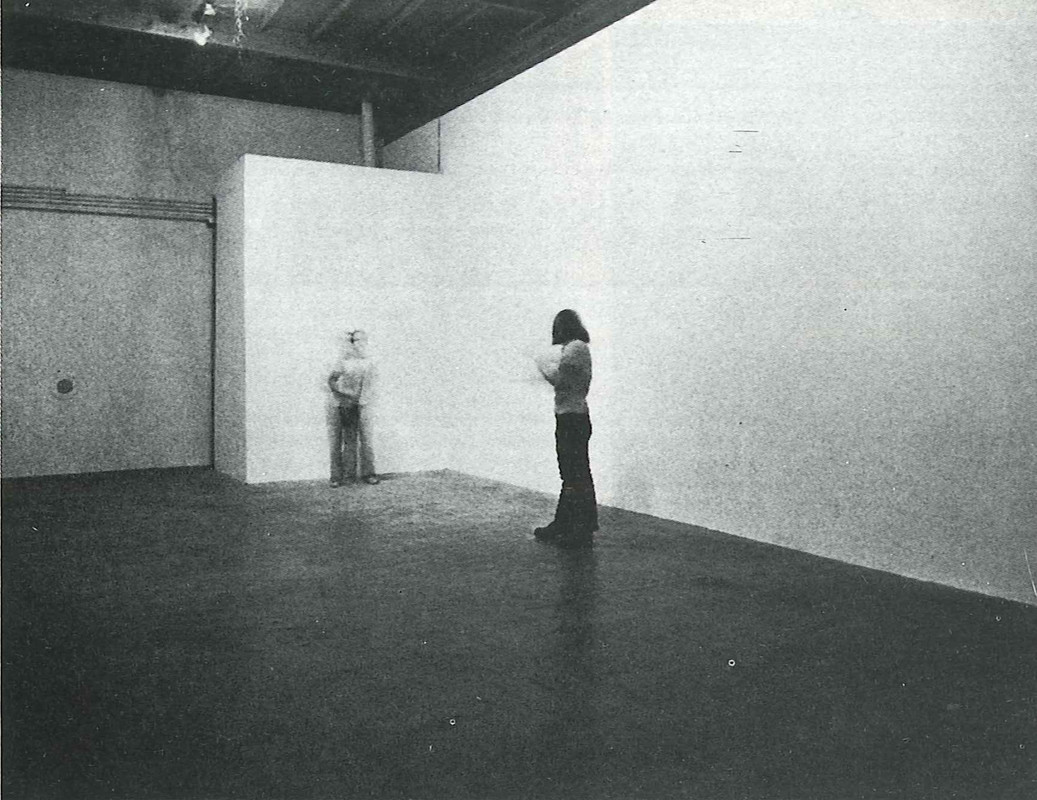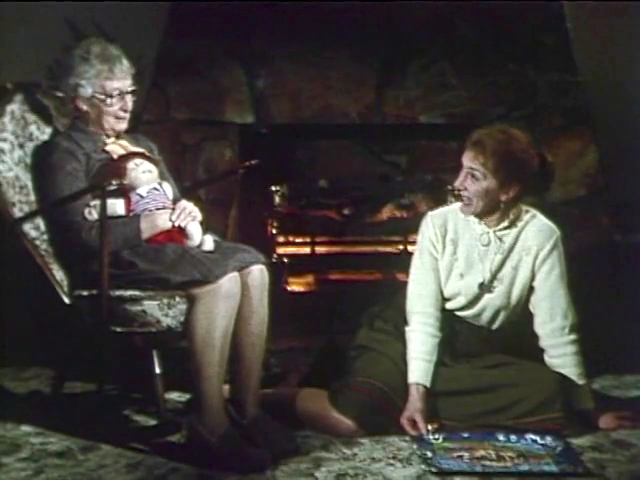documentary
“Anderntags hat man sofort getauft, weil jede Mutter lieber ein «Gotteskindli» auf die Arme nahm.” Wir Bergler in den Bergen sind eigentlich nicht schuld, daß wir da sind [We Who Dwell in the Mountains Cannot Be Blamed for Being There] (Fredi M. Murer, 1974)
Nov
17
.jpg)
A mountain man smokes his pipe, accompanied by a sow and a toddler in a wooden playpen. The Alps are all around them (via). DP: Iwan P. Schumacher.
A movie set in the woods or mountains*
– Gisler-Arnold Babette, midwife (via)
Murer describes the people from Switzerland's gorges in three movements, along the lines of a symphony
* the Bales 2025 Film Challenge for November is, again, not date-based, but follows a sloppy schmaltzy all-American Thanksgiving-y narrative. Trying to make it work my way.
we are not what we seemThe White Rose [The White Rose: Jay DeFeo’s Painting Removed by Angelic Hosts] (Bruce Conner, 1967)
Nov
9
1965

Workmen during the dismantling of The Rose in Jay DeFeo's studio on Fillmore Street, San Francisco on November 9, 1965. Screenshot taken from a clip made available by the Paula Cooper Gallery on Vimeo. DP: Bruce Conner..
– words inscribed in the bottom of DeFeo's painter's stool
“My whole idea behind this in the first place was to see how dumb America was. How dumb the world is.”Psychic Confession (Danny Korem, 1982)
Oct
23

James Hydrick spins a one dollar bill – balanced on top of a pin, locked into an airtight, glass box – with the power of his own mind.
– James Hydrick
La sixième face du pentagone [The Sixth Face of the Pentagon] (Chris Marker + François Reichenbach, 1968)
Oct
21
1967

Armed police seen from the back. In front of him someone holds up a sign that reads WHY WAR. DPs: Tony Daval, Chris Marker & Christian Odasso.
“Mr. Everyman explains how to look like a Japanese and thus impress those wild and not very civilized people. Mrs. Everyman replies that for savages, they look remarkably civilized. Meanwhile, Mr. Everyman, seeing more people looking even more Japanese, is reassured. Mrs. Everyman sees soldiers parading in European uniform. She smiles ironically. But now a number of typical Japanese walk into the house. Her irony disappears. And Mr. Everyman is not ashamed to admit… he is mystified.”Le mystère Koumiko [不思議なクミコ / The Koumiko Mystery] (Chris Marker, 1965)
Oct
11
1964
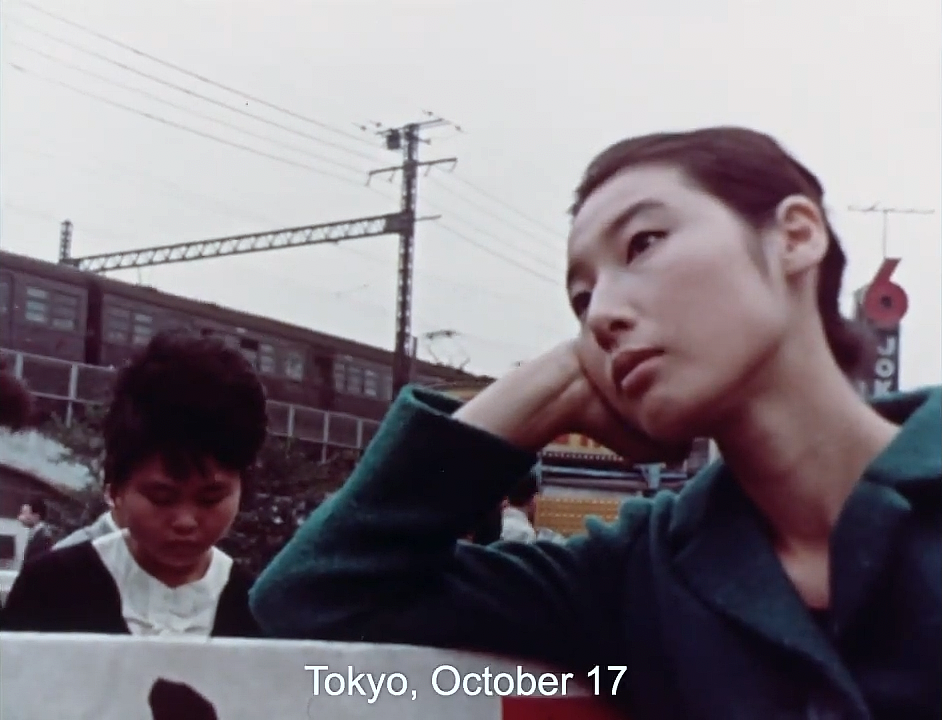
The film covers multiple days. Koumiko thinks on October 17. DP: Chris Marker.
– narrator
Happy Birthday to John [Happy Birthday John Lennon] (Jonas Mekas, 1995)
Oct
9
1972
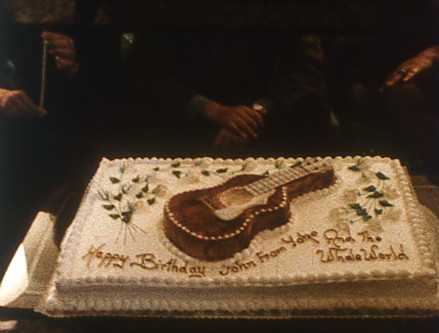
A rectangular birthday cake with a chocolate acoustic guitar spells out Happy Birthday John From Yoko And The Whole World. Presumed DP: Jonas Mekas.
On October 9th, 1972 an exhibition of John and Yoko's art – designed by the Master of the Fluxus movement, George Maciunas and curated by David Ross – opened at the Syracuse Museum of Art in New York. On the same day, an unusual group of John and Yoko's friends, including Ringo Starr, Allen Ginsberg, and Paul Krasner, gathered to celebrate John's birthday.
“Thank you for your card and your ice-cream, I love you very much!”Grey Gardens (Albert + David Maysles, Ellen Hovde + Muffie Meyer, 1975)
Oct
5
1973

Washed out felt-tip penned well-wishes read: OCTOBER 5th – 1973 “GREY GARDENS” AT 78 IT IS TRUE – YOU CAN LIVE TO BE 80 TOO. DPs: Albert & David Maysles.
– Edith 'Big Edie' Bouvier Beale, saying goodbye to her birthday party guests
Calle Santa Fe (Carmen Castillo, 2007)
Oct
5
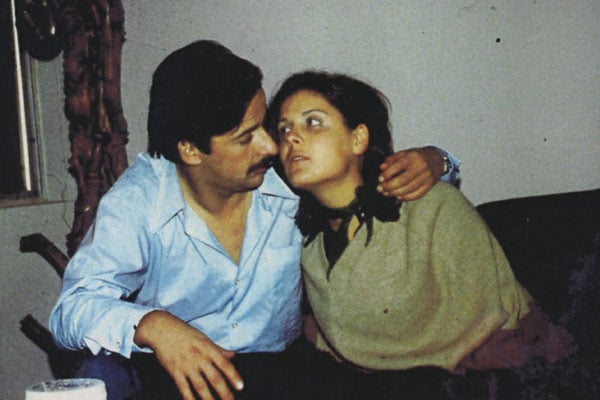
Miguel Enriquez holding Carmen Castillo in a family snapshot. DPs: Ned Burgess, Sebastián Moreno, Raphaël O'Byrne & Arnaldo Rodríguez.
